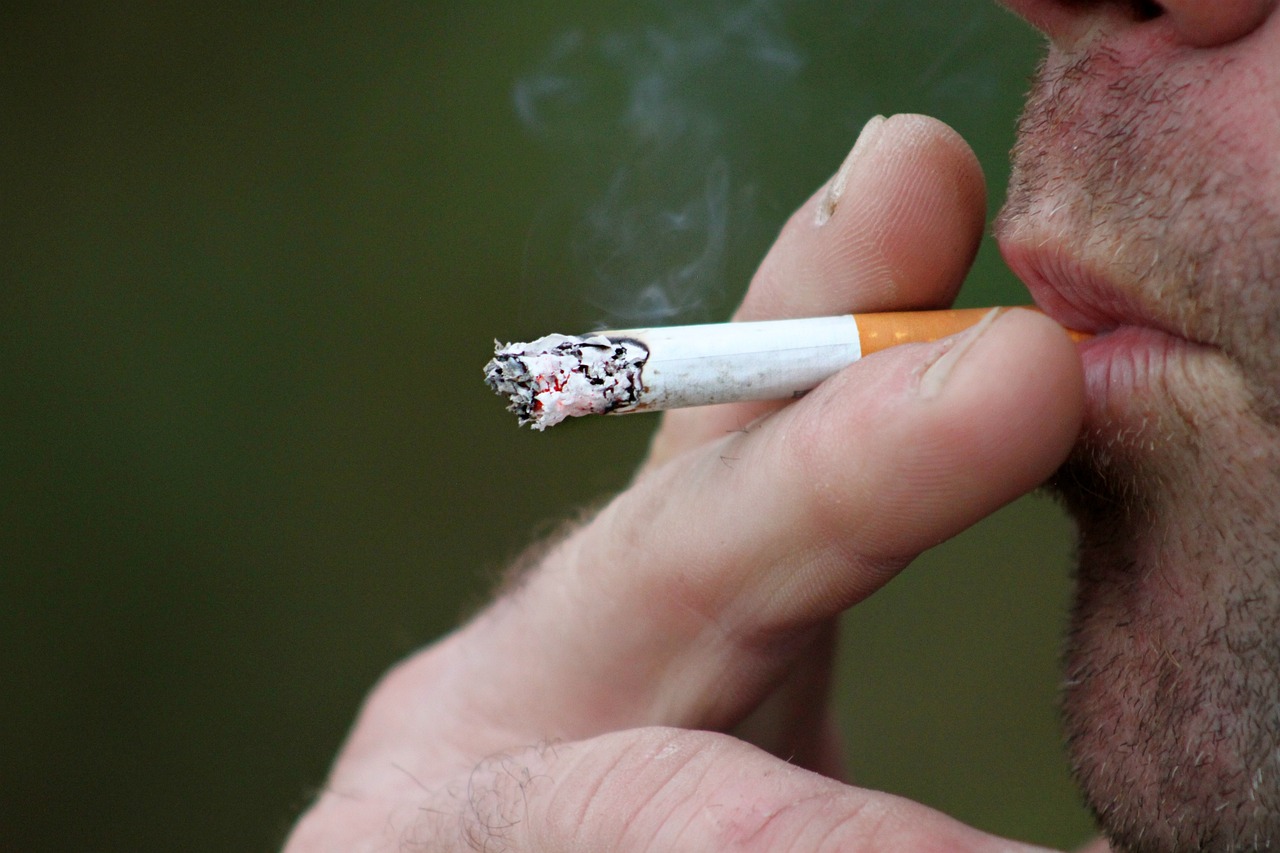Can Smoking Cause Erectile Dysfunction?

Smoking is among the most prevalent bad habits of modern times, yet its negative impacts on health are well documented and widely known. Among the most serious consequences of smoking are heart disease, lung cancer, and chronic respiratory issues. However, less is discussed about the impact of smoking on men’s sexual health, specifically on the ability to achieve and maintain an erection. Erectile dysfunction (ED) affects millions of men worldwide and can significantly impact the quality of life and relationships. In this article, we will focus on whether and how smoking contributes to the development of erectile dysfunction and why this issue should not be overlooked.
Consequences of Smoking for Sexual Health
Smoking is known as a major risk factor for a number of health problems, but its impact on erectile dysfunction is often overlooked. At the heart of this issue is the complex effect of nicotine and other harmful substances contained in smoke on the vascular and nervous systems. The primary way in which smoking contributes to erectile dysfunction is its negative impact on blood circulation. Nicotine and other chemical substances in cigarettes cause narrowing of the blood vessels and damage to their walls, which can lead to chronic blood shortages in the penis during an erection. This process, known as atherosclerosis, reduces blood flow, which is key to achieving and maintaining an erection.
Besides vascular problems, smoking also affects the nervous system. Long-term exposure to toxic substances in cigarettes can damage nerve endings and disrupt nerve communication between the brain and sexual organs. This can lead to difficulties in stimulation and maintaining an erection.
Another factor is that smoking often coincides with other health problems, such as high blood pressure and diabetes, which can also contribute to erectile dysfunction. This complex set of problems makes smoking one of the significant risk factors for sexual health. Understanding these mechanisms can help men better understand the consequences of their habit and motivate them to quit. The health of the vascular and nervous systems is important not only for overall health but also for maintaining a healthy erection.
Numbers Speak Volumes: Smoking and Its Impact on Erectile Function
- Studies show that smokers have up to a 51% higher likelihood of experiencing erectile dysfunction compared to non-smokers. This data comes from an extensive meta-analysis that examined the relationship between smoking and ED in men.
- Men who smoke more than 20 cigarettes a day have a 60% higher risk of developing erectile dysfunction than those who smoke fewer than 10 cigarettes a day. This shows a direct relationship between the amount of smoked tobacco and the risk of ED.
- In men under 40 who smoke, the likelihood of developing erectile dysfunction is approximately double compared to non-smokers. This indicates that even young men can face significant risks associated with smoking.
- Up to 25% of men who suffered from smoking-induced erectile dysfunction noted an improvement in their erectile function after quitting smoking. This data confirms that quitting smoking can have a positive impact on sexual health.
- Former smokers have a lower risk of developing erectile dysfunction than current smokers, but they still have a 30% higher likelihood of ED than men who have never smoked. This increased risk persists, although it is reduced after quitting smoking.
- According to estimates by the World Health Organization (WHO), smoking globally contributes to approximately 20% of all cases of erectile dysfunction in men.
These statistics demonstrate a strong connection between smoking and erectile dysfunction, emphasizing the importance of prevention and cessation of smoking for improving men’s sexual health.
What Types of Cigarettes Affect Erection?
All types of cigarettes can negatively affect an erection, regardless of their composition or method of use. Here are different types of cigarettes and their impact on erectile function:
- Conventional cigarettes: Conventional cigarettes contain tobacco and a wide range of harmful chemicals, including nicotine, tar, and carbon monoxide. These substances cause narrowing of vessels and damage their walls, reducing blood flow to the penis and increasing the risk of atherosclerosis. All of which contribute to the development of erectile dysfunction.
- Light cigarettes: Light cigarettes are often considered “less harmful” due to their lower content of tar and nicotine. However, these cigarettes still contain sufficient amounts of harmful substances that negatively affect the vascular and nervous systems. Light cigarettes thus also contribute to the risk of erectile dysfunction.
- Electronic cigarettes (e-cigarettes, vaping): E-cigarettes use nicotine solutions that are inhaled in the form of vapor. Although they do not contain many toxic substances from conventional cigarettes, nicotine itself causes narrowing of vessels and can negatively affect blood flow to the penis. Additionally, some studies suggest that long-term vaping can have similar harmful effects on vessels as smoking conventional cigarettes.
- Cigars and cigarillos: Although cigars and cigarillos are often not smoked as frequently as conventional cigarettes, they contain much higher concentrations of nicotine and tar. These substances can also contribute to the development of erectile dysfunction, especially if consumed regularly.
- Smokeless tobacco (snus, chewing tobacco): Even though smokeless tobacco does not cause lung inflammation like smoking, it contains high amounts of nicotine, which can affect the vascular system and contribute to erectile dysfunction through vessel narrowing and increased blood pressure.
Regardless of the type of cigarettes or the form of tobacco use, all products containing nicotine and other harmful chemicals can negatively affect erectile function. Therefore, quitting any form of smoking or tobacco use is the right step towards improving erectile health and overall well-being.
How Does Smoking Affect Male Fertility? Is There a Connection Between Smoking and Sperm Quality?
Smoking has a significantly negative impact on male fertility, especially on sperm quality. One of the main consequences of smoking is the reduction in the overall number of sperm. Studies show that men who smoke may have up to 23% fewer sperm than non-smokers. This decrease in sperm count reduces the chances of successful fertilization of the egg.
Besides reducing the number of sperm, smoking also affects their motility, which is a major factor for the ability of a sperm to reach and fertilize an egg. Nicotine and other toxic substances in cigarettes disrupt sperm motility, further reducing the likelihood of successful conception.
Another problem is that smokers are more likely to have sperm with abnormal shapes, which can affect their functionality and ability to penetrate the egg. Smoking also increases the risk of DNA damage in sperm. Toxic substances in cigarettes can cause DNA fragmentation, which can lead to infertility, miscarriages, or genetic defects in offspring. This process is often associated with oxidative stress, which damages sperm at the molecular level, including their genetic information. This means that even if fertilization occurs, the quality of the embryo may be compromised.
Another factor that smoking negatively affects is the production of testosterone – a hormone for male fertility. Reduced levels of testosterone can lead to lower sperm production, reduced libido, and other fertility problems. Therefore, smoking not only affects the quality of sperm but also the hormonal balance, which is essential for maintaining healthy fertility. Besides direct effects on sperm and the hormonal system, smoking increases the risk of erectile dysfunction, which can indirectly affect fertility. If a man is unable to achieve and maintain an erection during sexual intercourse, it can significantly complicate successful fertilization. Fortunately, some negative effects of smoking on fertility are to some extent reversible. After quitting smoking, sperm quality can gradually improve. Research suggests that significant improvements in count, motility, and morphology of sperm can occur within three months after quitting smoking. However, this recovery depends on the length and intensity of previous smoking, and full improvement may take longer.
Given these facts, it is clear that smoking has a significant negative impact on male fertility. Quitting smoking may be one of the most important steps for improving fertility and increasing the chances of successful conception.
How Long After Quitting Smoking Does Erectile Dysfunction Improve?
The time after which erectile function can improve after quitting smoking depends on several factors, including age, overall health, length and intensity of smoking, and the extent of damage to the vascular and nervous systems. Generally, however, improvement can occur relatively quickly.
- Short-term improvement: Within a few weeks to months after quitting smoking, some men may notice an improvement in erectile function. As the body begins to recover from the effects of nicotine, the vessels may start to expand, improving blood flow to the penis.
- Medium-term improvement: During 3 to 12 months, further improvement can occur as the body gradually rids itself of toxic substances from smoking and restores vascular health. At this time, a significant difference should be noticeable in men who suffered from mild to moderate erectile dysfunction.
- Long-term improvement: Within one year and beyond, the risk of erectile dysfunction may significantly decrease, with some studies suggesting that after two years of quitting smoking, the function of vessels may be very similar to that of non-smokers. However, in men who smoked for many years or who have other health problems, full restoration may not be possible, but improvement can still be expected.
Although some damage caused by long-term smoking may be irreversible, quitting smoking is a key step towards improving not only erectile function but also overall health. Men who quit smoking can reduce the risk of developing erectile dysfunction and improve the quality of their sexual life.
How Do the Effects of Smoking on Erection Compare to Other Addictive Substances, Such as Alcohol or Drugs?
The effects of smoking on erection are significant, but they may vary compared to other addictive substances, such as alcohol or drugs. Here is an overview of how these substances compare in terms of their impact on erectile function:
- Smoking: Smoking damages vessels, leading to restricted blood flow to the penis. Nicotine causes vessel narrowing (vasoconstriction) and long-term smoking contributes to the development of atherosclerosis (arterial hardening), which can permanently reduce blood flow. Smoking has more lasting and progressive effects on erectile function, especially in men who smoke long-term and intensely. It also increases the risk of erectile dysfunction related to cardiovascular diseases.
- Alcohol: Alcohol can have both short-term and long-term effects on erection. In small doses, alcohol can reduce inhibitions and relax, which can help during sexual activity. However, in higher doses, alcohol acts as a depressant of the central nervous system, which can lead to suppression of sexual function, including difficulties in achieving or maintaining an erection. Acute alcohol intoxication can cause temporary erectile dysfunction, known as “alcohol impotence”. This condition is usually temporary, but frequent excessive drinking can lead to long-term problems. Chronic alcohol use can lead to permanent damage to vessels and nerves, contributing to permanent erectile dysfunction. Alcoholism is also associated with hormonal changes, such as reduced testosterone levels, which further affect sexual function.
- Drugs and stimulants: These substances can increase sexual arousal in the short term by raising dopamine levels in the brain. However, stimulants also increase blood pressure and cause vasoconstriction, which can lead to erection problems. High doses of stimulants can lead to an inability to achieve an erection, even though the user experiences increased sexual arousal. Long-term use of stimulants is associated with permanent damage to vessels and nerves, which can lead to chronic erectile dysfunction.
Each of these addictive substances affects erection in a different way, but all can lead to erectile dysfunction, especially with long-term and excessive use. Smoking has significant and permanent effects on the vascular system, which directly affects the ability to achieve an erection. Alcohol and drugs can have both short-term and long-term negative impacts on erectile function, with some effects being reversible after discontinuation, while others may be permanent. Overall, a healthy lifestyle without these substances is the best way to maintain sexual health and performance.
Conclusion
In conclusion, smoking has a fundamental and negative impact on erectile function, regardless of the type of cigarettes or form of nicotine use. Harmful substances contained in tobacco products cause narrowing of vessels, damage their walls, and disrupt nerve communication, leading to erection problems. Quitting smoking is one of the most effective steps to reduce the risk of erectile dysfunction and improve overall sexual health. The sooner you decide to quit, the greater the chances of restoring normal erectile function and improving the quality of life. The decision to quit smoking will affect not only lung and heart health but also intimate areas of life, which are important for most men.
Related articles









